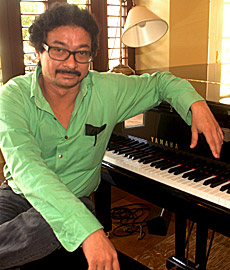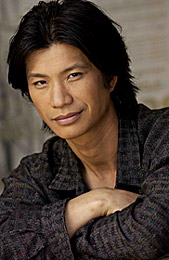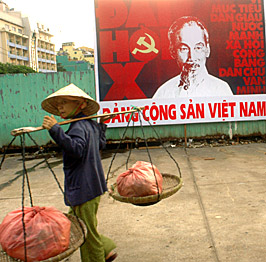Vietnam's New Realism
For ages, strict communist control kept patriotic themes on screen, and bored viewers dashing for bootleg Hollywood discs. But "Saigon Eclipse" could change that, with an All Star cast and hopes of turning Vietnam into the newest outpost of Asian cinema
By Ron Gluckman / Ho Chi Minh City
THE WORLD PAYS SCANT ATTENTION to Vietnamese cinema, and no wonder. Cinemas exist only in the biggest cities, and even then, they are old edifices, ill-equipped for the kind of modern films craved by a nation of youngsters. Not that this largely young nation would find any Hollywood blockbusters in fewer than a dozen theaters serving an audience of 84 million people.
The Communist government maintains strict control of the film industry, resulting in a flood of state-funded flicks with proper nationalist themes but few enthusiasts. Yet, a new law opening cinema doors to private firms could spur on the "New Vietnam Realism," envisioned by one director, Othello Khanh, who is seizing the opportunity to make features that will not only entertain locals, but make a splash overseas.
"For a long time, film makers have been coming to this country, borrowing our scenery, using the people," says Khanh, without bitterness. After all, he has fueled the process, running one of Vietnamís largest film production companies, assisting on scores of movies and documentaries. Now, he says itís time to move on: himself, to features; Vietnam, to making and exporting its own movies.
 "We have Hollywood and Bollywood," he says wistfully, seated atop a
stool at the luxurious new Park Hyatt in the former city of Saigon. "Maybe,
with good will and luck, someday, we can create our own Bac Ho Ly-Wood."
"We have Hollywood and Bollywood," he says wistfully, seated atop a
stool at the luxurious new Park Hyatt in the former city of Saigon. "Maybe,
with good will and luck, someday, we can create our own Bac Ho Ly-Wood."
Bac Ho is Uncle Ho, as Vietnamese call Ho Chi Minh, father of the revolution whose imprint extends not only to the renaming of Saigon in his honor, but also to rigorous state control on many industries like film. This has kept a damper not only on investment, but also salaries of actors and directors.
A new "Vietnamese realism" is most sorely needed in a nation typically stereotyped on screen as a war setting. In two decades since launching its reforms, Vietnamís economy has surged and modernization has swept its cities.
But, even as Asian cinema is soaring from Bombay and Bangkok to Beijing and Seoul, Vietnamese movie-making remains mired in old values. Independent films, only recently allowed, cannot compete with big-budget western movies widely available on copies in shop that appeal to young Vietnamese, the majority born long after Hoís struggles ended along with the countryís war.
Overseas, that war continues to color the view of Vietnam projected on the big screen: "Platoon," "Apocalypse Now," "The Deer Hunter," "Born on the Fourth of July," were all about Vietnam, but filmed elsewhere. Even recent movies like "The Quiet American," while filmed in-country, focus on the war.
 "People are used to seeing Vietnam as rice fields and misery," Khanh
says. "We want to create a new Vietnam realism. We want to show this county
in the midst of renewal, how it is now, how people live."
"People are used to seeing Vietnam as rice fields and misery," Khanh
says. "We want to create a new Vietnam realism. We want to show this county
in the midst of renewal, how it is now, how people live."
Khanh has assembled an All Star cast of local and overseas Vietnamese. From America come the Nguyens, Johnny and Dustin (no relation), on-screen hunks with pedigrees; Dustin a pinup after "Jump Street," Johnny huge in Thailand with "Tom Yung Goong."
From France comes beautiful young half-Vietnamese actress Marjolaine Bui. Domestic stars include Nhu Quynh, whose 25-year career launched with "Indochine," and Truong Ngoc Anh, one of Vietnamís queens of the cinema.
Khanhís script loosely reworks Nguyen Duís 19th century masterpiece "The Story of Kieu," but not in a form many are likely to recognize. The original was about a beautiful girl, who sacrifices herself, and love, to save her father.
Khanhís version will be about the Vietnamese film industry, and his role in it over the past decade. "This is a modern story, set in present Vietnam."
The movie started shooting in May 2006, but the idea has been kicking around since Mr Khanh arrived in Vietnam in 1995. The script, by Khanh, draws on diaries kept since he was recruited to help modernize the local TV industry.
 That was nearly 11 years ago when America lifted sanctions on doing business in
Vietnam, "and the next day, I got a fax inviting me to come to
Vietnam," he recalls.
That was nearly 11 years ago when America lifted sanctions on doing business in
Vietnam, "and the next day, I got a fax inviting me to come to
Vietnam," he recalls.
Khanh might have seemed an odd choice, not only because he was born in Paris and had never set foot in the homeland of his father, Quasar Khanh. The film maker was then editing his debut documentary, on Mexican revolutionary Subcomandante Marcos, the ski-masked leader of the Zapatista uprising.
Effused with leftist zeal, he says, "I showed my film, and my Vietnamese comrades said it was a good film, but the revolution here was over. They wanted help to develop a commercial industry."
So, Khanh began making commercials for the likes of Coca Cola, Unilever and BP. In 1999, he set up CreaTV, which now has 50 staff, and credits ranging from National Geographic to CBS.
"All these years, my focus," he says, "was to pull back as a director, to develop the company and the skills." But still, the director scribbled in his diary, always dreaming of making movies.
Opportunity knocked late last year, when private firms were finally allowed to make films. The law still fell short of what many had hoped, as companies must be majority-owned by Vietnamese. But ethnic Vietnamese like Khanh qualify.
The budget for "Saigon Eclipse" might seem modest, barely a million dollars, all privately raised. Thatís pocket change by Hollywood standards, but four times what most local features cost, according to Cat Vu, who writes for Lao Dong newspaper, and has covered Vietnamís film industry for 30 years.
Actors, she estimates, earn perhaps $1200 for starring roles. Top directors like Bui Thac Chuyen (whose "Chuyen Cua Pao," of Paoís Story, swept the Dieu Vang, Vietnamís most prestigious film awards, in March) might make $2000.
Most survive on family support, personal appearances, television and side-jobs. Films are often made piggy-back, directors and actors working simultaneous productions.
The Nguyens, who were born in Vietnam but fled with their families during the fall of Saigon in 1975, are doing the same, now filming "The Rebel," Johnnyís directorial debut, starring Dustin, in Hanoi.
While state control stifles creativity, a lack of capital undermines the industry. Vietnam, she reckons, has less than a dozen cinemas. Tickets typically cost $2, still beyond the means of most in the countryside, where films often screen free.
 Such largesse is one benefit of state-controlled cinema, but it also undercuts
the profit margin for private films and removes any incentive to modernize
crusty theaters into the Multiplexes booming across Asia. Another hurdle - film
is deemed politically sensitive, so cinemas must be Vietnamese owned.
Such largesse is one benefit of state-controlled cinema, but it also undercuts
the profit margin for private films and removes any incentive to modernize
crusty theaters into the Multiplexes booming across Asia. Another hurdle - film
is deemed politically sensitive, so cinemas must be Vietnamese owned.
Still, things have evolved from the post-war years, when most directors had no equipment to make films. "They trained on paper!" she notes. "You cannot learn to make movies by theory. "What Vietnam really needs is to send film makers overseas to learn skills and techniques, like they did in Korea."
Or take the approach that Mr Khanh advocates with "Saigon Eclipse," bringing Vietnamese stars from around the globe back home. "The idea is to share skills, to bring this energy here. We want to do the same thing with movie making that we did with television in this country, improve the skills and qualities.
"Itís also about how to make a Vietnamese story appeal to an international audience." At this stage, he says, the only way to make a quality feature is for export. Hence, Mr Khahnís feature will be largely in English. Shooting started in May 2006 and he plans to wrap in six weeks and be in cinemas by Christmas.
Like Uncle Ho, this old revolutionary has patiently waited for years to strike a blow for local cinema, all the while, scheming and dreaming of the day.
Now, he hopes that just as Paris and Washington long ago belatedly learned to respect this small Southeast Asian nation, Hollywood will also soon take notice.
Ron Gluckman is an American reporter who is based in Bangkok, but who roams around Asia for a number of publications, such as the Wall Street Journal, which ran a shorter version of this story in May 2006. This is the original version.
Picture of Othello Kahn (top), and Ho Chi Minh (bottom) by Ron Gluckman
Cast pictures courtesy of "Saigon
Eclipse."
To return to the opening page and index
push here
[right.htm]
